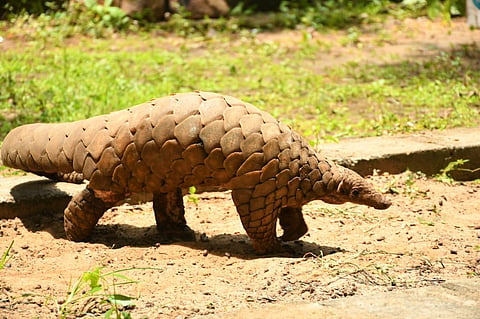Manipur villages unite to protect endangered Pangolins along Indo-Myanmar border
In a landmark conservation effort, the headsmen of 230 tribal villages located along the Indo-Myanmar border in Manipur have united to combat the illegal wildlife trade of the critically endangered Chinese Pangolins (Manis pentadactyla). These pangolins, which are primarily found in the northeastern region of India, have become increasingly rare due to rampant poaching. The Indian pangolin, another subspecies mostly found in Central India, is also endangered.
Pangolins, known as ecosystem engineers for their role in building burrows and controlling insect populations, are among the most trafficked wild mammals globally. Their scales are in high demand in Chinese wet markets, where they are allegedly used to prepare traditional medicines. In India, pangolins are listed under Schedule I of the Wildlife (Protection) Act, 1972, which prohibits hunting, trade, and other forms of exploitation.
A 2023 report by WWF-India and TRAFFIC revealed that 1,203 pangolins were poached and trafficked in 342 seizure incidents across the country. In the northeastern state of Manipur, pangolin meat has long been a delicacy among Naga tribes. However, the Tangkhul Naga Awunga Long (TNAL), the apex body overseeing the community management and governing laws of the Naga tribes, has recently passed a resolution banning the hunting of Chinese Pangolins within their jurisdiction.
The TNAL, which represents 230 villages in the Ukhrul, Kamjong, and Senapati districts of Manipur, has garnered the signatures of all its member villages in support of this resolution. "Once frequently visible in the bush, now pangolins are rare to be seen," said Kashung Tennyson, president of TNAL. He emphasized the need for strict measures to save the species before it goes extinct. "A resolution passed by the TNAL is binding for all members of the community, and it will disrupt the existing illegal wildlife trade network and trafficking routes," Tennyson added.
The Indo-Myanmar border has emerged as a major hotspot for illegal wildlife trade. To address this issue, the Wildlife Trust of India (WTI) has partnered with the government and local tribesmen to conserve the species before it becomes extinct. "Community-driven initiatives like this can be incredibly impactful and play a crucial role in conserving wildlife, especially in the Northeast region," said Jose Louies, CEO of WTI.
The demand for pangolin scales and meat for their alleged medicinal properties continues to fuel the illegal trade across India. In 2022, authorities seized 7 kg of pangolin scales in Jagdalpur, Chhattisgarh, and earlier this year, a joint anti-poacher team from Odisha and Chhattisgarh officials seized 2.7 kg of pangolin scales and rescued 12 live pangolins.
"There is a high demand for its scales and meat in the wet markets, and pangolins being hunted in Manipur find their way past the border to international markets across Southeast Asia," said Monesh Singh Tomar, a Senior Field Officer with WTI.
The collaborative effort between the Naga community and conservation organizations represents a significant step forward in protecting this endangered species.

